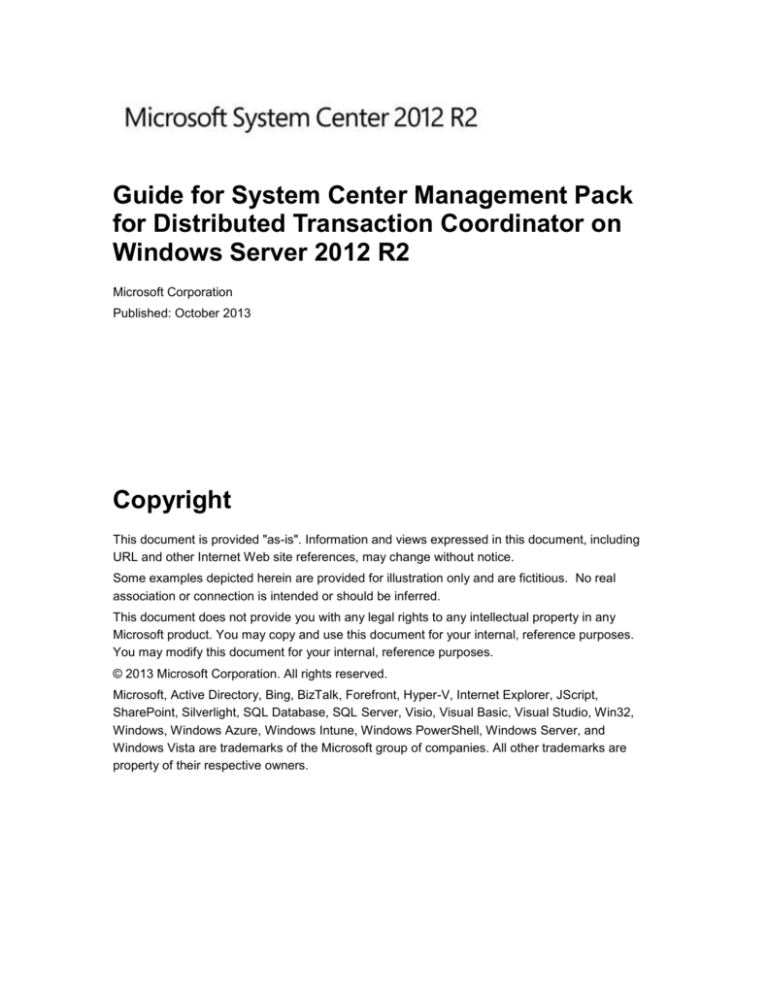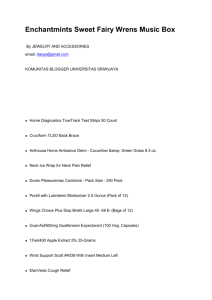
Guide for System Center Management Pack
for Distributed Transaction Coordinator on
Windows Server 2012 R2
Microsoft Corporation
Published: October 2013
Copyright
This document is provided "as-is". Information and views expressed in this document, including
URL and other Internet Web site references, may change without notice.
Some examples depicted herein are provided for illustration only and are fictitious. No real
association or connection is intended or should be inferred.
This document does not provide you with any legal rights to any intellectual property in any
Microsoft product. You may copy and use this document for your internal, reference purposes.
You may modify this document for your internal, reference purposes.
© 2013 Microsoft Corporation. All rights reserved.
Microsoft, Active Directory, Bing, BizTalk, Forefront, Hyper-V, Internet Explorer, JScript,
SharePoint, Silverlight, SQL Database, SQL Server, Visio, Visual Basic, Visual Studio, Win32,
Windows, Windows Azure, Windows Intune, Windows PowerShell, Windows Server, and
Windows Vista are trademarks of the Microsoft group of companies. All other trademarks are
property of their respective owners.
Contents
Guide for System Center Management Pack for Distributed Transaction Coordinator (MSDTC) on
Windows Server 2012 R2 ............................................................................................................ 4
Management Pack Purpose ......................................................................................................... 5
Monitoring Scenarios ................................................................................................................ 5
How Health Rolls Up ................................................................................................................. 7
Key Monitoring Scenarios ............................................................................................................ 8
Configuring the Management Pack for Distributed Transaction Coordinator (MSDTC) on
Windows Server 2012 R2 ....................................................................................................... 11
Links ........................................................................................................................................... 11
Appendix: Management Pack Contents ........................................................................................ 12
Appendix: Rules............................................................................................................................. 15
Rules ....................................................................................................................................... 15
Guide for System Center Management Pack
for Distributed Transaction Coordinator
(MSDTC) on Windows Server 2012 R2
This guide was written based on version 7.1.10100.0 of the Management Pack for Distributed
Transaction Coordinator (MSDTC) on Windows Server 2012 R2.
Guide History
Release Date
Changes
October 2013
Original release of this guide
Supported Configurations
The Windows MSDTC 2012 R2 Management Pack for System Center Operations Manager 2012
R2 is designed to monitor Windows MSDTC 2012 R2 only. A dedicated Operations Manager
management group is not required.
The following table details the supported configurations for the Management Pack for Windows
MSDTC 2012 R2:
Configuration
Support
Windows Server 2012 R2
Windows Server 2012 R2
Clustered servers
Yes
Agentless monitoring
Not supported/not tested
Virtual environment
Yes
Management Pack Scope
This management pack supports up to Windows Server 2012 R2.
Prerequisites
The following requirements must be met to run this management pack:
4
The following management packs must be installed prior to installing the Windows MSDTC 2012
R2 Management Pack:
Windows Server Library Management Pack
Microsoft Windows Server Cluster Management Pack
Files in this Management Pack
The Management Pack for Windows MSDTC 2012 R2 includes the following files:
Microsoft.Windows.MSDTC.2012.R2.mp
Management Pack Purpose
Monitoring Scenarios
How Health Rolls Up
For details on the discoveries, rules, monitors, views, and reports contained in this Management
pack, see Appendix: Management Pack Contents.
Monitoring Scenarios
The Windows MSDTC 2012 R2 Management Pack manages MSDTC service that an operator or
administrator is interested in monitoring, configuring, or reporting on.
The following component events are captured in this management pack:
Windows Server 2012 R2 Server Distributed Transaction Coordinator (MSDTC)
Objects the Windows MSDTC 2012 R2 Management Pack Discovers
The Windows MSDTC 2012 R2 Management Pack discovers the object types described in the
following table.
Object type
Discovered
automatically
Description
MSDTC 2012 R2 Service Discovery
Yes
Servers with MSDTC
installed
MSDTC 2012 R2 clustered MSDTC Role
Discovery
Yes
Clustered MSDTC roles
5
Not all of the objects are automatically discovered. Use overrides to discover those that are not
discovered automatically. For information about discovering objects, see the "Object Discoveries
in Operations Manager 2012 R2" topic in Operations Manager 2012 R2 Help
Use the following procedure to modify automatic discovery parameters.
To use an override to change the parameters for automatic discovery
1. In the Authoring pane, expand Management Pack Objects, and then click Object
Discoveries.
2. On the Operations Manager toolbar, click Scope, and then filter the objects that appear
in the details pane.
3. In the Operations Manager toolbar, use the Scope button to filter the list of objects, and
then click MSDTC 2012 R2 DTC Role Discovery.
4. On the Operations Manager toolbar, click Overrides, click Override the Object
Discovery, and then click For all objects of type: Windows Server, For a group.
5. In the Overrides Properties dialog box, click the Override box for the parameter(s) you
wish to modify.
6. Under Management Pack, click New to create an unsealed version of the management
pack, and then click OK.
Classes
The following diagram shows the classes defined in this management pack.
6
Windows!Microsoft.Windows.ComputerRole
Microsoft.MSDTC.6.3.ServerRole
Microsoft.MSDTC.6.3.ClusteredRoles
Legend
Microsoft.MSDTC.6.3.Servers
ComputerRole
Derived from Built in Class
Service/ClusteredRole
Server with MSDTC
service or Clustered role
Hosting
Derived from
How Health Rolls Up
The following diagram shows how the health states of MSDTC service roll up in this management
pack.
7
Key Monitoring Scenarios
The following table provides a summary of the monitors to be created for MSDTC.
A summary of monitors and the details for each monitor are provided in the following tables:
Server Monitors
Clustered Role Monitors
Monitor Summary
Target
Type
Aggregate
Name
Enabled?
MSDTC
servers
Unit
Availability
MSDTC Service
State
Yes
Unit
Availability
Reinstall MSDTC
Yes
Unit
Availability
Resolve
Transactions
Manually
Yes
Unit
Availability
Change MSDTC
Log Path
Yes
Unit
Availability
Free Disk Space or
Move the Log File
to Another Drive
Yes
Unit
Availability
Increasing the Log
Yes
Size or Resolve Old
Transactions
Unit
Availability
Increase the
Number of MSDTC
Log Buffers
Yes
Unit
Availability
MSDTC Service
Log Availability
Yes
Unit
Availability
Reinstall MSDTC
Log
Yes
Unit
Availability
Remove the Read
Only Attribute from
the MSDTC Log
Yes
Unit
Availability
Restart MSDTC
Log and Restart
MSDTC
Yes
8
Target
Type
Aggregate
Name
Enabled?
Unit
Availability
Run the MSDTC
Reset Log Utility
Yes
Unit
Configuration
Configure MSDTC
on a Failover
Cluster
Yes
Unit
Configuration
Restart the Cluster
Yes
Unit
Configuration
Start the Cluster
Service and Start
MSDTC
Yes
Unit
Availability
Check the XA
Provider Registry
Key
Yes
Unit
Availability
Free up System
Memory
Yes
Unit
Availability
Restart MSDTC
Yes
Unit
Availability
Start MSDTC
Yes
Unit
Availability
Stop MSDTC
Yes
Unit
Configuration
Confirm that the
Upgraded Service
is Running Properly
Yes
Unit
Configuration
Login account has
no permission
Yes
Unit
Configuration
Report an Invalid
Error Code to
Microsoft
Yes
Unit
Configuration
Restart Component
Services and
Confirm That
MSDTC Is Running
Properly
Yes
Unit
Configuration
Stop and Restart
MSDTC
Yes
Unit
Configuration
Check the MSDTC
Registry Key
Yes
9
Target
MSDTC
clustered role
Type
Aggregate
Name
Enabled?
Unit
Configuration
Check XA Registry
Keys
Yes
Unit
Configuration
Confirm That the
Server Has Access
to The OLE
Transaction
Managers Key
Yes
Unit
Configuration
Restore the Default
Account
Yes
Unit
Configuration
Turn on the
Remote Registry
Service
Yes
Unit
Availability
Check XA Registry
Keys for
Transactions
Processing
Yes
Unit
Availability
Register the
Component on the
Server
Yes
Unit
Availability
Resolve the In
Doubt Transactions
Yes
Unit
Availability
Restart MSDTC for
Transactions
Processing
Yes
Unit
Configuration
Stop and then
Restart MSDTC for
volume snapshot
support
Yes
Unit
Availability
Role State
Yes
10
Configuring the Management Pack for Distributed
Transaction Coordinator (MSDTC) on Windows
Server 2012 R2
This section provides guidance on configuring and tuning this management pack.
Best Practice: Create a Management Pack for Customizations
Best Practice: Create a Management Pack for Customizations
By default, Operations Manager saves all customizations such as overrides to the Default
Management Pack. As a best practice, you should instead create a separate management pack
for each sealed management pack you want to customize.
When you create a management pack for the purpose of storing customized settings for a sealed
management pack, it is helpful to base the name of the new management pack on the name of
the management pack that it is customizing.
Creating a new management pack for storing customizations of each sealed management pack
makes it easier to export the customizations from a test environment to a production environment.
It also makes it easier to delete a management pack, because you must delete any dependencies
before you can delete a management pack. If customizations for all management packs are
saved in the Default Management Pack and you need to delete a single management pack, you
must first delete the Default Management Pack, which also deletes customizations to other
management packs.
Links
The following links connect you to information about common tasks that are associated with
System Center management packs:
System Center 2012 - Operations Manager
Management Pack Life Cycle
How to Import a Management Pack
Tuning Monitoring by Using Targeting and Overrides
How to Create a Run As Account
How to Export a Management Pack
How to Remove a Management Pack
Operations Manager 2007 R2
11
Administering the Management Pack Life Cycle
How to Import a Management Pack in Operations Manager 2007
How to Monitor Using Overrides
How to Create a Run As Account in Operations Manager 2007
How to Modify an Existing Run As Profile
How to Export Management Pack Customizations
How to Remove a Management Pack
For questions about Operations Manager and management packs, see the System Center
Operations Manager community forum.
A useful resource is the System Center Operations Manager Unleashed blog, which contains “By
Example” posts for specific management packs.
For additional information about Operations Manager, see the System Center 2012 - Operations
Manager Survival Guide and Operations Manager 2007 Management Pack and Report Authoring
Resources
Important
All information and content on non-Microsoft sites is provided by the owner or the users
of the website. Microsoft makes no warranties, express, implied, or statutory, as to the
information at this website.
Appendix: Management Pack Contents
The Management Pack for Distributed Transaction Coordinator (MSDTC) on Windows Server
2012 R2 discovers the object types described in the following sections. Not all of the objects are
automatically discovered. Use overrides to discover those objects that are not discovered
automatically.
Microsoft.MSDTC.6.3.Discovery
Discovery Information
Interval
Enabled
When to Enable
43200 seconds
True
not applicable
12
Related Monitors
Monitor
Data source
Interval
Alert
Reset
Cor
Enabl
When to
Behavior
res
ed
Enable
True
“not
applicabl
e”
pon
din
g
Rul
e
Microsoft.MSD
TC.6.3.Monito
r.Service
Service
name =
MSDTC
Interval
period
True
Automatic
Alert
priority:Normal
Alert severity:
Error
Note
If you are using connectors, you can disable the monitor and enable its corresponding
rule to enable alerts without changing health status.
Note
Disable the rule and enable its corresponding monitor to enable alerts, state changes,
and health rollup.
Related Views
View
Description
Rules and
Monitors that
Populate the
View
Microsoft.MSDTC.6.3.State.View
Show the MSDTC services
Microsoft.M
SDTC.6.3.Monit
or.Service
13
Microsoft.MSDTC.6.3.ClusteredRoleDiscovery
Discovery Information
Interval
Enabled
When to Enable
43200 seconds
True
not applicable
Related Monitors
Monitor
Data source
Interval
Alert
Reset
Cor
Enabl
When to
Behavior
res
ed
Enable
True
“not
applicabl
e”
pon
din
g
Rul
e
Microsoft.MSD
TC.6.3.Monito
r.ClusteredRo
le
MSCLUST
ER_Resour
ce
Interval
period
False
Automatic
Note
If you are using connectors, you can disable the monitor and enable its corresponding
rule to enable alerts without changing health status.
Note
Disable the rule and enable its corresponding monitor to enable alerts, state changes,
and health rollup.
Related Views
View
Description
Rules and
Monitors that
Populate the
View
Microsoft.MSDTC.6.3.ClusteredRoles
.State.View
Show the clustered MSDTC roles
Microsoft.M
SDTC.6.3.Monit
or.ClusteredRo
le
14
Appendix: Rules
The following tables list the rules from the Management Pack.
Note
Be aware that some of these rules may create noise in your environment.
Rules
Event Based Rules
Name
Type
Event Id
Enabled?
Required file is missing from the
System32 folder in Windows
directory.
Event
Collection
4143,4212,4213,4214,4129
Yes
Confirm network connectivity
and firewall setting.
Event
Collection
4358,4359
Yes
System reported an unexpected
error condition. Reinstall
MSDTC to resolve it.
Event
Collection
4418
Yes
The service must be restarted or
missing files.
Event
Collection
4424,4228
Yes
Check low-resource condition.
Event
Collection
4425
Yes
Restart MSDTC
Event
Collection
4363,4367,4368,4370,4155,4168,
Yes
4169,4170,4209,4229,4230,4233,
4355,4356,4433,4434,4435,4436,
4441,4455,4456,53321
15







